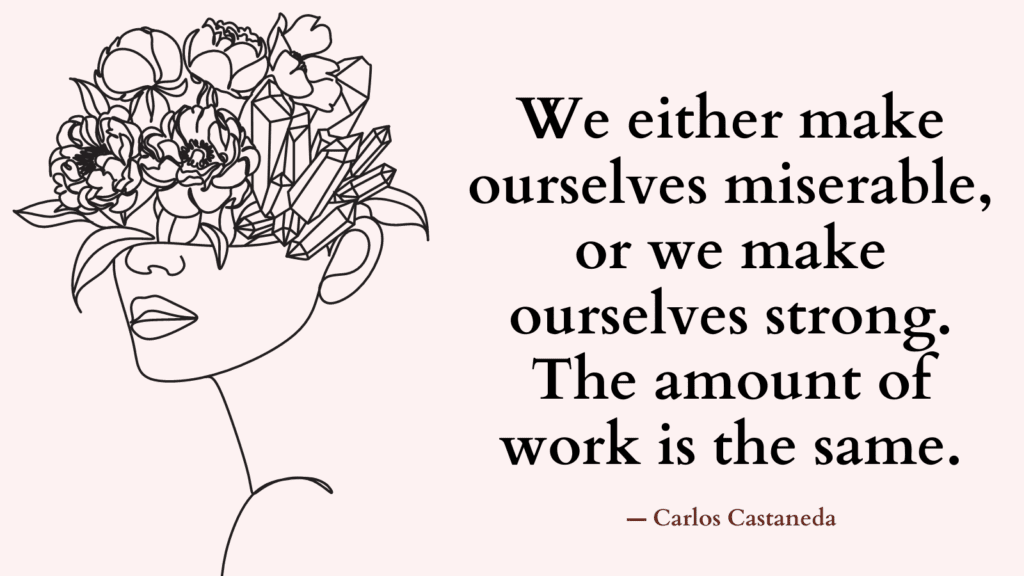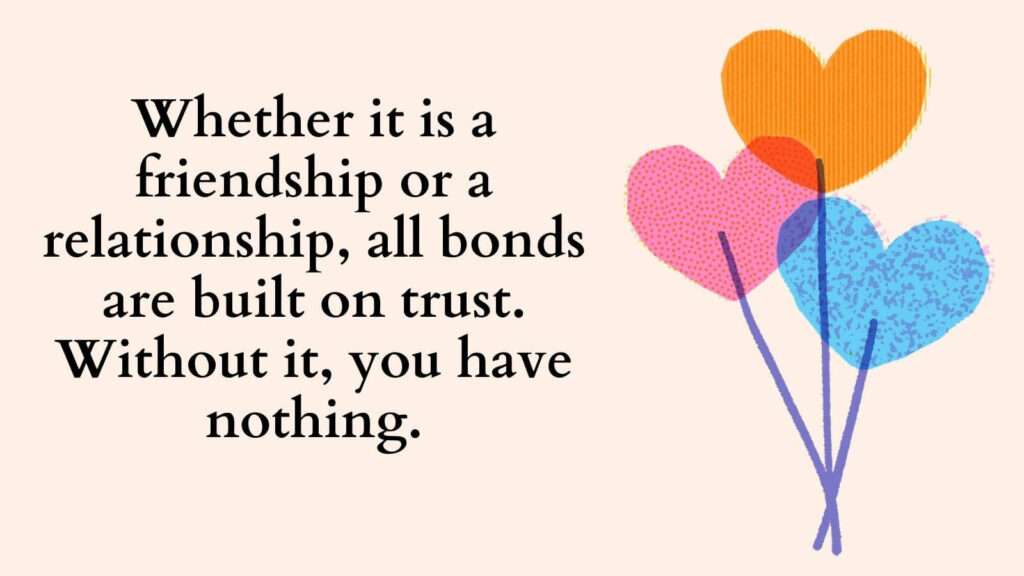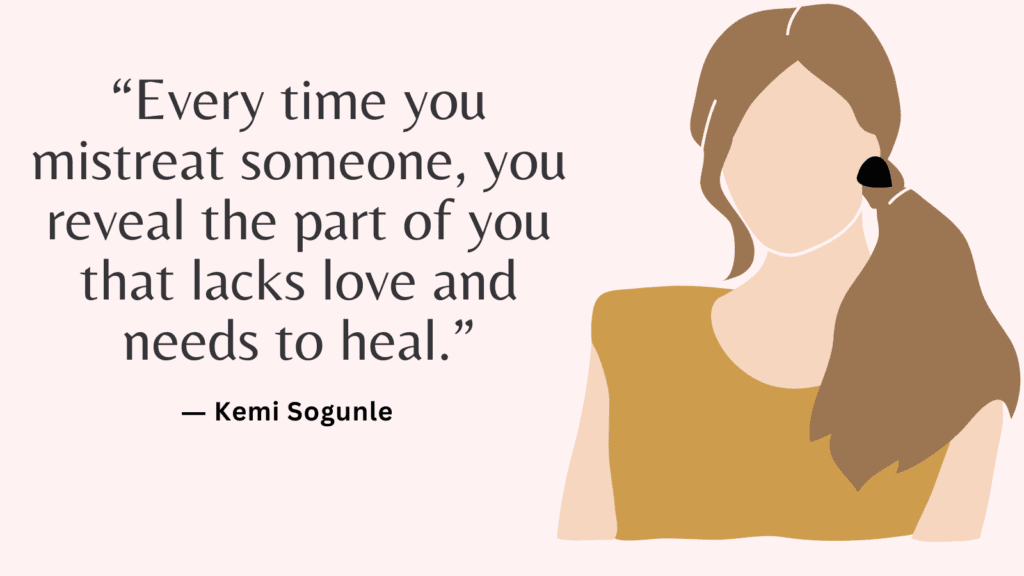This post contains examples of boundaries to help you start setting healthy boundaries.
What Are Boundaries?
Boundaries are dividing lines that define who you are as an individual and what we will and will not tolerate from others.
Boundaries make it clear that you’re a unique individual and not an extension of someone else.
Boundaries can take many forms.
- Physical boundaries: they protect your space, property, and body.
- Sexual boundaries: they protect your right to consent.
- Emotional boundaries: they allow you to have your own emotions and thoughts and protect you from emotional harm, such as abuse, betrayal, invalidation, etc.
Related: Best 9 Tips On How To Receive More In Life And Relationships?
What Boundaries Are Not
Boundaries are not demands.
We may ask someone to change their behavior. But it’s simply a request and the person is still free to choose how to behave.
Boundaries are not mean.
They’re not meant to hurt people.
Rather boundaries protect you and the relationship. They limit conflict and maintain respect within the relationship.
Related: Top 25 Tips On How To Set Boundaries In A Toxic Relationship? (+FREE Worksheets PDF)
Do You Have Weak Boundaries?
Do you relate to any of the following?
- Interactions with others leave you feeling taken advantage of and resentful.
- Making requests or saying no when you need to leaves you feeling guilty.
- You avoid directly communicating your expectations to others.
- You don’t have a strong sense of who you are or what your values and goals.
- You don’t make time for self-care.
- You don’t speak up often enough when you want something or when you’re being treated poorly.
- You don’t spend enough quality time with people you care about or perusing your interests.
- You often accept blame for things you didn’t do or couldn’t control.
- You often struggle to say no because you don’t want to disappoint people.
- You think you don’t matter or aren’t as important as others.
- You’re frequently overscheduled or tired.
- You’re tuned in to how other people feel, but aren’t always aware of how you’re feeling.
If so, you may be struggling to set healthy emotional boundaries in your relationships.
Related: Healthy Boundaries Quiz (+Free Pdf Worksheets)
Personal Bill of Right
Examples of Boundaries
Communicating a Boundary Examples
“I’m not interested in talking about this person when they’re not here.”
“Please do not comment on my (weight, appearance, etc.)”
“I appreciate your decision, but this is my decision.”
“If you continue to yell at me, I will have to walk away.”
“I have made up my mind about this.”
“I don’t want to discuss this matter.”
“We need to Change how we communicate, because it doesn’t seem to be working for either of us.”
“I would like it if you supported me by listening instead of offering advice.”
“I hope you will find a way to solve this problem.”
Related: People Pleaser Quiz (+Top 21 Proven Ways to Stop People Pleasing)
Examples of Boundaries In A Relationship
“I’m not okay with you talking to me that way.”
“I’m not ready to have sex yet.”
“I would love to see you, but I usually spend Sundays with my family.”
“I’d like us to put our phones aside when we’re on a date.”
“I’m not comfortable talking about that just yet.”
Related: Top 10 Emotional Boundaries In Dating You Should Set From The First Date
Examples of Boundaries At Work
“I can’t help you with that, but I can do…”
“I am not available to discuss work-related concerns on weekends.”
“I’m focusing on an important task right now. Can we schedule some time to talk later?”
“I’m at capacity right now. I can’t commit to that.”
Examples of Boundaries With Yourself
“I will ask for help before I’m overwhelmed.”
“I will use loving terms when describing my body or talking to myself.”
“When I feel lonely, I will not call my ex.”
“I will not answer work-related phone calls outside of working hours.”
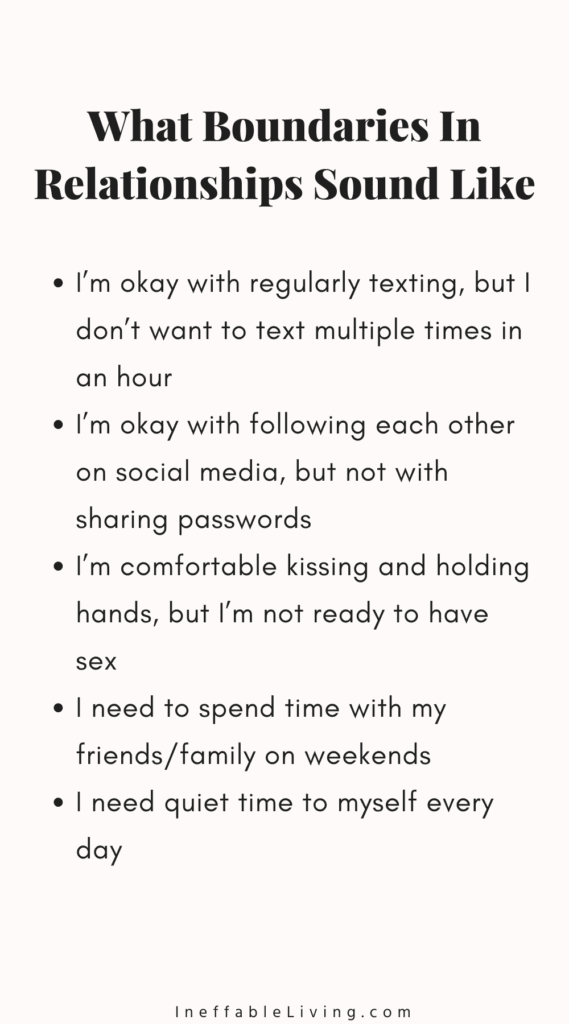
Taking Break During a Difficult Conversation Examples
“I’m feeling really overwhelmed. Can we pause this?”
“I need a second to think. Can we take a break?”
“I need some time to myself. Can we talk about this later?”
“I know this is an important conversation, but I feel overwhelmed. Can I call you tomorrow?”
“I really want to finish this conversation when I’m in a better headspace.”
“I need some time and space to think this through.”
Related: How To Set Boundaries With Narcissistic Parents?
Saying No Examples
“I wish I could help, but I’m not available right now to support you.”
“I care about you deeply and I’m sorry you have to go through this. But I can’t help you with your issue.”
“I can’t support you financially, but I’m willing to support you in another way.”
“I can’t commit to that right now. Can we work to find a compromise?”
“I trust that you will be able to find a solution to this problem.”
“I have nothing planned, but that doesn’t mean I’m available.”
“I’m not able to take on additional work right now.”
“Thank you but I am not available.”
“I appreciate that you asked me but I can’t do it.”
“I appreciate you thinking of me but I can’t.”
“I would love to help, but this seems like an issue that should be handled with the help of a professional.”
“I am honored that you asked but I can’t commit to that right now.”
“Sorry I can’t make it this time, maybe next time.”
“I’m sorry I am not available this weekend, maybe next weekend.”
Related: Why Nice Guys Suck? Best 19 Practical Strategies To Stop Being The Nice Guy
Why Setting Boundaries Can Be Difficult?
Setting boundaries can be difficult for a variety of reasons. Here are a few:
1. Fear of rejection: People may fear that setting boundaries will cause the other person to reject them or end the relationship.
2. Guilt: People may feel guilty or selfish when setting boundaries, especially if they have a history of prioritizing others’ needs over their own.
3. Lack of assertiveness skills: Some people may not know how to effectively communicate their needs and boundaries, which can lead to them being disregarded or ignored.
4. Fear of conflict: Setting boundaries can sometimes lead to conflict or uncomfortable conversations, which some people may want to avoid.
5. Concerns about others’ reactions: People may worry about how others will react to their boundaries, especially if they have a history of not enforcing them consistently.
Becoming aware of what could be preventing you from setting healthy boundaries is the first step in overcoming those barriers.
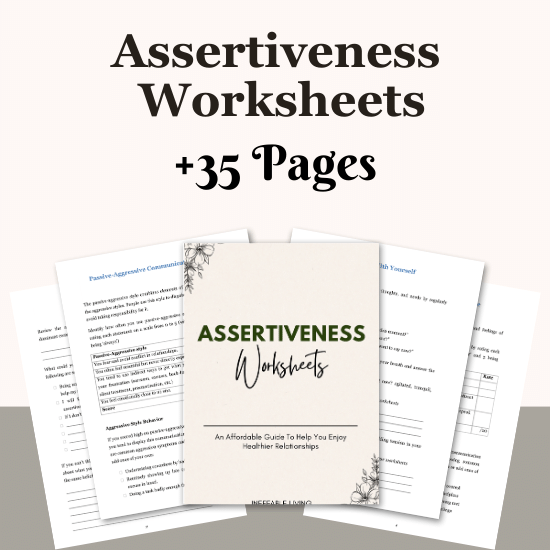
How to Set Healthy Boundaries?
Setting healthy boundaries is crucial for maintaining our emotional well-being and safeguarding our relationships. Here are some steps to help you establish and maintain healthy boundaries:
1. Understand your needs and values
Reflect on your own needs, values, and priorities.
Identify what is important to you and what you are willing and unwilling to tolerate in your relationships.
This self-awareness will serve as a guide when establishing boundaries.
2. Communicate assertively
Clearly express your boundaries in a calm and confident manner.
Use “I” statements to express your feelings and needs, such as “I need…” or “I feel uncomfortable when…”.
Be respectful but firm in your communication, making sure to validate your own emotions without blaming others.
3. Start small
Begin by setting boundaries in less challenging situations or with people you feel most comfortable with.
Gradually work your way towards more difficult conversations and relationships, building your confidence along the way.
4. Be clear and specific
Clearly define the boundaries you are setting.
Specify what behaviors are acceptable and unacceptable to you.
Avoid being vague or assuming that others will automatically understand your expectations.
Related: +100 Examples of Boundary Violations & How to Deal With It
5. Practice saying no
Learning to say no without guilt or excessive explanation is essential for setting healthy boundaries.
Understand that it is okay to decline requests or activities that do not align with your needs or values.
Remember, saying no is not a rejection of others, but rather an act of self-care.
6. Prioritize self-care
Make self-care a priority in your life.
This includes taking time for yourself, setting aside relaxation time, engaging in activities you enjoy, and setting boundaries around your personal time and space.
By prioritizing self-care, you send a message to yourself and others that your well-being is important.
7. Be aware of red flags
Pay attention to signs of boundary violations or manipulative behavior from others.
These can include guilt-tripping, gaslighting, or disregarding your boundaries altogether.
Recognize these red flags and take appropriate action to protect yourself and reinforce your boundaries.
Related: Top 5 Tips On How To Be Assertive Without Being Rude
8. Practice self-compassion
Setting and maintaining boundaries can be difficult, especially if you are not used to prioritizing your own needs.
Be kind and patient with yourself during this process.
Acknowledge that boundary-setting is a learned skill, and it may take time to develop and master.
9. Stick to your boundaries
Once you have established your boundaries, it’s important to enforce them consistently.
People may test or push against your boundaries, especially if they have become accustomed to crossing them in the past.
Stay firm and hold true to your boundaries, reinforcing their importance to yourself and others.
Related: Top 5 Self Love Exercises (+FREE Self-Love Resources)
Pro Tip: Use Setting Boundaries Worksheets
Worksheets provide an opportunity for self-reflection and increased self-awareness. They prompt you to think about your values, needs, and limits. By answering the questions or prompts on the worksheet, you gain a deeper understanding of yourself and what is important to you when it comes to setting boundaries.
Worksheets often include practical exercises or action steps. These can serve as a roadmap for implementing your boundaries in real-life situations. By following the guidance provided, you can practice assertiveness and boundary-setting skills in a structured manner.

Conclusion
Setting boundaries isn’t about forcing people to do what you want.
Rather, boundaries are about honoring your needs, expressing yourself clearly and communicating to others what you will and will not tolerate.
FAQ
What are some signs that my boundaries are being violated?
Some common signs that your boundaries may be violated include feeling uncomfortable or resentful in certain situations, experiencing anxiety or stress when interacting with specific individuals, feeling drained or overwhelmed after spending time with certain people, or sensing a lack of control over your own choices and decisions.
Should I feel guilty for setting boundaries?
It is important to recognize that setting boundaries is a healthy and necessary practice for personal well-being.
However, it is common for individuals to feel guilty initially because they fear disappointing others or being seen as selfish.
Remember that taking care of your own needs and maintaining your emotional health is not something you should feel guilty about.
Communicating your boundaries respectfully and assertively can help alleviate any guilt you may feel.
Related: Best 10 Books On Self Love And Healing
Can setting boundaries lead to conflict in relationships?
Setting boundaries can occasionally lead to conflict in relationships, especially if the other person is not accustomed to or resistant to change.
This conflict is often temporary, as it arises from a shift in dynamics.
However, healthy relationships can grow stronger when both parties learn to respect each other’s boundaries over time.
Open and honest communication is key to addressing conflicts that may arise during this process.
What if someone close to me doesn’t respect my boundaries?
If someone close to you consistently ignores or disrespects your boundaries, it is crucial to assertively communicate your needs and reinforce your boundaries.
You may need to remind them of your boundaries and explain how their actions impact you.
If the person continues to disregard your boundaries, it may be necessary to reevaluate the relationship and consider seeking support from a professional to navigate this challenging situation.
Related: Top 18 Self Esteem Exercises (+FREE CBT For Self-Esteem Worksheets PDF)
Are boundaries necessary in all types of relationships?
Yes, boundaries are necessary in all types of relationships.
Whether it’s a romantic relationship, family dynamics, friendships, or professional interactions, clear and healthy boundaries are crucial for maintaining respectful and balanced relationships.
Can boundaries change over time?
Boundaries can indeed change over time.
As we grow and evolve, our needs, values, and priorities may shift.
It’s important to regularly assess and adjust our boundaries to align with our current circumstances and personal growth.
How do I know if my boundaries are too rigid or too loose?
Finding the right balance with boundaries can be a delicate process.
If your boundaries are too rigid, you may find it difficult to connect with others, be open to new experiences, or allow for growth.
On the other hand, if your boundaries are too loose, you may feel overwhelmed, taken advantage of, or have difficulty prioritizing your own needs.
Striking a balance means setting boundaries that protect your well-being while also allowing for healthy connections and personal growth.
Related: How Confident Am I Quiz (+Best 13 Tips on How to Carry Yourself with Confidence)
How do personal values influence boundary-setting?
Personal values play a significant role in boundary-setting.
Your values reflect what is important to you, and they provide guidelines for establishing limits that align with your beliefs and principles.
Reflect on what matters most to you, consider how certain actions or behaviors may conflict with your values, and use this awareness to guide your boundary-setting decisions.
